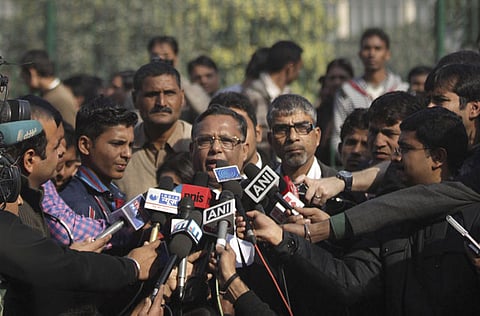India reinstates law against gay sex
Religious groups laud Supreme Court verdict as gay activists decry ruling

New Delhi: India’s Supreme Court reinstated a colonial-era ban on gay sex on Wednesday that could see homosexuals jailed for up to ten years in a major setback for rights campaigners in the world’s biggest democracy.
A two-judge bench struck down a Delhi High Court ruling in 2009 that section 377 of the Indian penal code prohibiting “carnal acts against the order of nature” infringed the fundamental rights of Indians.
The landmark ruling four years ago emboldened the still largely closeted gay community, which has since campaigned publicly against widespread discrimination and ignorance.
But a two-judge Supreme Court bench headed by G.S. Singhvi, who will retire on tomorrow, found that the High Court had overstepped and that the law against gay sex was constitutionally valid.
“It is up to parliament to legislate on this issue,” Singhvi said in the judgement, which crushed the hopes of activists who had fought the case and led to tears outside the court.
The 2009 High Court decision was strongly opposed by religious groups, particularly leaders of India’s Muslim and Christian communities, who appealed to the Supreme Court.
“Such a decision was totally unexpected from the top court. It is a black day for the community,” Arvind Narayan, a lawyer of the Alternative Law Forum gay rights group, told reporters outside court.
‘Very angry’
“We are very angry about this regressive decision of the court,” he added.
Rights campaign group Amnesty International said the ruling was a “body blow to people’s rights to equality, privacy and dignity”, while a legal challenge from gay rights groups is also likely.
“We will explore all options, probably look into the option of a review petition,” T. Tandon, a lawyer appearing for Naz Foundation, a non-profit group that works with HIV and Aids patients, said outside the courthouse.
The government indicated that it will take the legislative route to deal with the issue.
The apex court in its verdict put the ball in Parliament’s court to decide on the desirability of deleting the relevant section from Indian Penal Code.
“It is the prerogative of the Supreme Court under the Constitution to test the constitutionality of a law. They are exercising their prerogative. We have the prerogative to make laws. We shall exercise our prerogative,” Law Minister Kapil Sibal told reporters.
Asked ‘how soon’ will the government bring the matter in Parliament, Sibal said: “Well, if Parliament runs, we shall take it up.”
Information and Broadcasting Minister Manish Tewari said the government will act on the verdict of the Supreme Court.
“As far as the government is concerned ... when M. Veerappa Moily was the Law Minister, he had said that section 377 should be decriminalised ... The government will take cognisance of it and let you know,” he said.
Sign up for the Daily Briefing
Get the latest news and updates straight to your inbox

